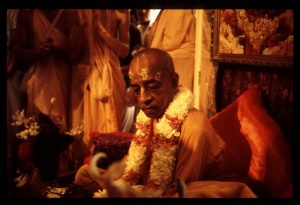CC Madhya 1.112 (1975): Difference between revisions
(Vanibot #0027: CCMirror - Mirror CC's 1996 edition to form a basis for 1975) |
(Vanibot #0020: VersionCompareLinker - added a link to the Version Compare feature) |
||
| Line 2: | Line 2: | ||
<div style="float:left">'''[[Sri Caitanya-caritamrta (1975)|Śrī Caitanya-caritāmṛta (1975)]] - [[CC Madhya (1975)|Madhya-līlā]] - [[CC Madhya 1 (1975)|Chapter 1: The Later Pastimes of Lord Śrī Caitanya Mahāprabhu]]'''</div> | <div style="float:left">'''[[Sri Caitanya-caritamrta (1975)|Śrī Caitanya-caritāmṛta (1975)]] - [[CC Madhya (1975)|Madhya-līlā]] - [[CC Madhya 1 (1975)|Chapter 1: The Later Pastimes of Lord Śrī Caitanya Mahāprabhu]]'''</div> | ||
<div style="float:right">[[File:Go-previous.png|link=CC Madhya 1.111 (1975)|Madhya-līlā 1.111]] '''[[CC Madhya 1.111 (1975)|Madhya-līlā 1.111]] - [[CC Madhya 1.113 (1975)|Madhya-līlā 1.113]]''' [[File:Go-next.png|link=CC Madhya 1.113 (1975)|Madhya-līlā 1.113]]</div> | <div style="float:right">[[File:Go-previous.png|link=CC Madhya 1.111 (1975)|Madhya-līlā 1.111]] '''[[CC Madhya 1.111 (1975)|Madhya-līlā 1.111]] - [[CC Madhya 1.113 (1975)|Madhya-līlā 1.113]]''' [[File:Go-next.png|link=CC Madhya 1.113 (1975)|Madhya-līlā 1.113]]</div> | ||
{{CompareVersions|CC|Madhya 1.112|CC 1975|CC 1996}} | |||
{{RandomImage}} | {{RandomImage}} | ||
==== TEXT 112 ==== | ==== TEXT 112 ==== | ||
| Line 25: | Line 24: | ||
<div class="translation"> | <div class="translation"> | ||
After this, Kṛṣṇadāsa, the servant of Lord Caitanya Mahāprabhu, was delivered from the clutches of a Bhaṭṭathāri. Caitanya Mahāprabhu then preached that Lord | After this, Kṛṣṇadāsa, the servant of Lord Caitanya Mahāprabhu, was delivered from the clutches of a Bhaṭṭathāri. Caitanya Mahāprabhu then preached that Lord Kṛṣṇa's name should also be chanted by brāhmaṇas who were accustomed to chanting Lord Rāma's name. | ||
</div> | </div> | ||
| Line 32: | Line 31: | ||
<div class="purport"> | <div class="purport"> | ||
In the | In the Mālābāra district, a section of the brāhmaṇas are known as Nambudari brāhmaṇas, and the Bhaṭṭathāris are their priests. Bhaṭṭathāris know many tantric black arts, such as the art of killing a person, of bringing him under submission, and of destroying or devastating him. They are very expert in these black arts, and one such Bhaṭṭathāri bewildered the personal servant of Śrī Caitanya Mahāprabhu while the servant accompanied the Lord in His travels through South India. Somehow or other Śrī Caitanya Mahāprabhu delivered this Kṛṣṇadāsa from the clutches of the Bhaṭṭathāri. Śrī Caitanya Mahāprabhu is well known as Patita-pāvana, the savior of all fallen souls, and He proved this in His behavior toward His personal servant, Kṛṣṇadāsa, whom He saved. Sometimes the word Bhaṭṭathāri is misspelled in Bengal as Bhaṭṭamāri. | ||
</div> | </div> | ||
Latest revision as of 04:53, 27 January 2020

A.C. Bhaktivedanta Swami Prabhupada
TEXT 112
- tabe bhaṭṭathāri haite kṛṣṇa-dāsera uddhāra
- rāma-japī vipra-mukhe kṛṣṇa-nāma pracāra
SYNONYMS
tabe—after this; bhaṭṭa-thāri—a Bhaṭṭathāri; haite—from; kṛṣṇa-dāsera—of Kṛṣṇadāsa; uddhāra—the deliverance; rāma-japī—chanters of the name of Lord Rāma; vipra-mukhe—unto brāhmaṇas; kṛṣṇa-nāma—the name of Lord Kṛṣṇa; pracāra—preaching.
TRANSLATION
After this, Kṛṣṇadāsa, the servant of Lord Caitanya Mahāprabhu, was delivered from the clutches of a Bhaṭṭathāri. Caitanya Mahāprabhu then preached that Lord Kṛṣṇa's name should also be chanted by brāhmaṇas who were accustomed to chanting Lord Rāma's name.
PURPORT
In the Mālābāra district, a section of the brāhmaṇas are known as Nambudari brāhmaṇas, and the Bhaṭṭathāris are their priests. Bhaṭṭathāris know many tantric black arts, such as the art of killing a person, of bringing him under submission, and of destroying or devastating him. They are very expert in these black arts, and one such Bhaṭṭathāri bewildered the personal servant of Śrī Caitanya Mahāprabhu while the servant accompanied the Lord in His travels through South India. Somehow or other Śrī Caitanya Mahāprabhu delivered this Kṛṣṇadāsa from the clutches of the Bhaṭṭathāri. Śrī Caitanya Mahāprabhu is well known as Patita-pāvana, the savior of all fallen souls, and He proved this in His behavior toward His personal servant, Kṛṣṇadāsa, whom He saved. Sometimes the word Bhaṭṭathāri is misspelled in Bengal as Bhaṭṭamāri.